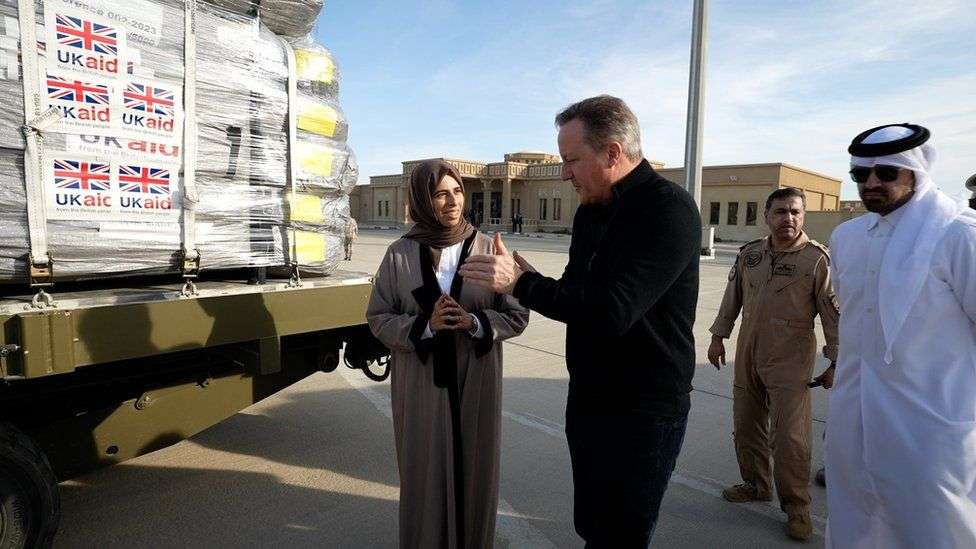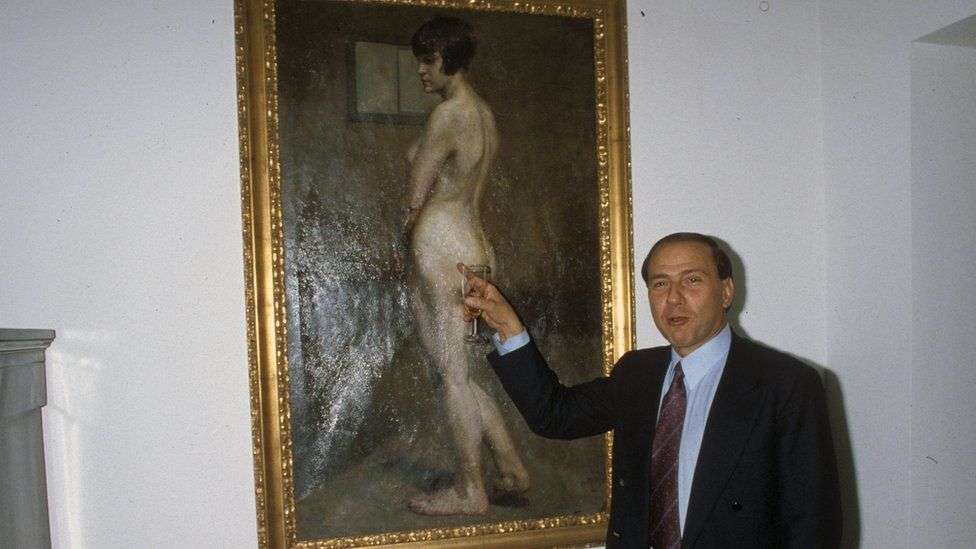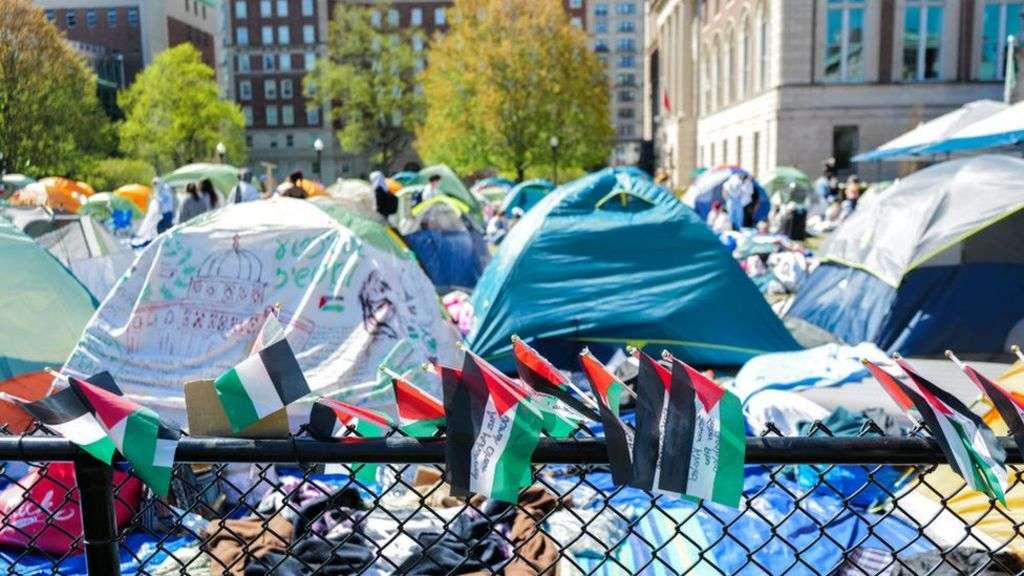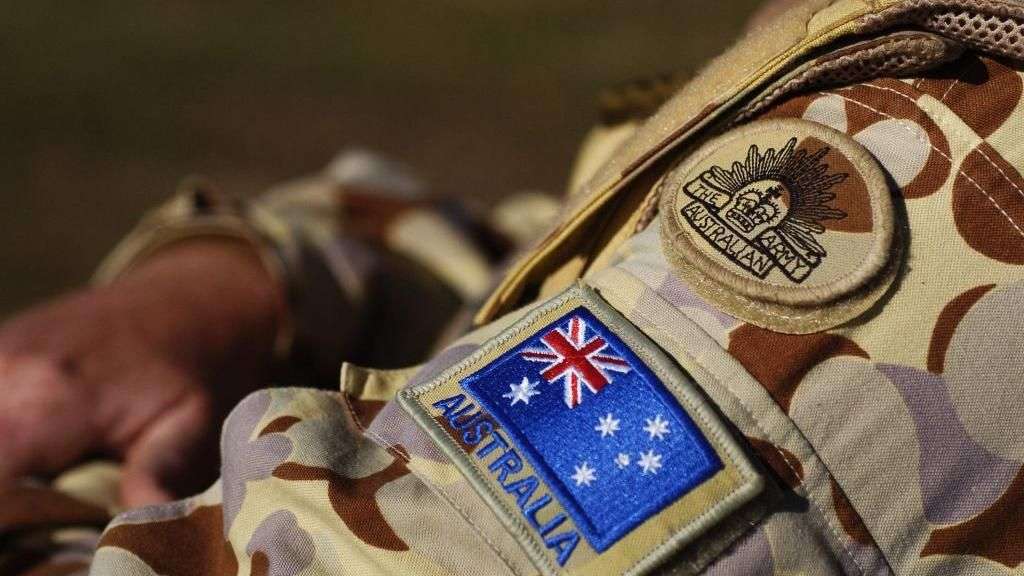The Qatar Emiri Air Force cargo plane, a hulking grey C17, sat by a runway at the sprawling Al Udeid airbase. Deep inside, Britain's Foreign Secretary Lord Cameron, in black loafers and sweater, attempted to push a pallet of humanitarian aid for Gaza into the aircraft. It wouldn't budge.
He stepped back while burly Qatari airmen in combat fatigues made some adjustments. But the former British prime minister wasn't giving up, and with a sudden shift, the bundle - part of nearly 30 tonnes of aid including tents and food - began to move into the belly of the plane.
Lord Cameron's latest Middle East tour was aimed at helping to broker a permanent ceasefire to the conflict, the release of the more than 132 remaining hostages, and an increase in the aid getting into Gaza on a daily basis. He's putting in a lot of effort, but so far at least, has little to show for it.
Standing by the plane's enormous wings, Lord Cameron told me: "Nobody wants this conflict to go on a moment longer than necessary. But I've always understood that you won't have a proper ceasefire if you've still got Hamas in place, able to launch attacks on Israel.
"Everyone has to understand, that must be dismantled, otherwise no peace, no ceasefire will be sustainable."
His latest round of in-person diplomacy (the day before he met Israel's Prime Minister Benjamin Netanyahu and Palestinian Authority President Mahmoud Abbas) came in advance of this weekend's talks under way in France, to free the hostages and pause hostilities.
But there still appears little prospect the suffering will end soon in Gaza. There's a chasm between the aid Gaza needs, and will need for years to come, and what it is currently receiving.
While Israel's bombardment of Gaza continues, the flow of aid is being drip-fed into the strip. Britain says 500 trucks a day are needed to provide basic needs - most days fewer than 200 make it inside. On one day this month, only 30 crossed into Gaza.
"It's vital we can actually get it into Gaza and crucially, once it's in Gaza, get it around Gaza," Lord Cameron said.
"What I was saying yesterday to the Israelis, they've got to deal with the bottlenecks. They've got to make sure the crossing points are opened more often. They've got to make sure the checking is done more quickly. They've got, crucially, to give the visas to the UN staff and the trucks that the UN staff need to get the aid around Gaza."
Nine out of 10 people are living on one meal a day in Gaza, according to the World Food Programme. All aid is subject to stringent inspections by Israel which does not want anything to get inside that could benefit Hamas.
Qatar and Britain are allies, the Gulf emirate and Israel are not. It hosts the Hamas political leadership, and has been a key mediator in talks to release the hostages still held by the group, which is proscribed as a terrorist organisation by several countries.
Qatar helped secure the previous week-long ceasefire in November that led to the freeing of 105 hostages taken in the attack of 7 October, which killed 1,300 people.
But as David Cameron arrived in Doha, a recording of Israel's Prime Minister Benjamin Netanyahu was leaked in which he described Qatar's role as a mediator in the Gaza war as "problematic". The British foreign secretary dismissed the criticism and said that Qatar's role was "helpful".
Qatar said it was appalled at the Israeli prime minister's remarks, which came just before this weekend's meeting in France, which will bring together William Burns, the head of the Central Intelligence Agency, his Israeli counterpart, David Barnea and Qatar's Prime Minister Sheikh Mohammed bin Abdulrahman al-Thani. The Egyptian intelligence chief Abbas Kamel will also attend.
The talks are aimed at freeing the Israeli captives and establishing a ceasefire, however wide the gap between Israel and Hamas's demands.
Hosting Lord Cameron at the airbase was Lolwah Rashid Al-Khater, Qatar's Minister of State for International Cooperation. Some 12 tonnes of aid on the plane are from Qatar, and even this joint consignment is far from enough said the minister.
"On some days, these past days, even less than 100 [trucks make it into Gaza]. This situation is very difficult. There are many bottlenecks. And as a matter of fact, man-created obstacles, I should say. According to the 4th Geneva Convention article 59, it is the obligation on the occupying power, in this case it would be Israeli occupation, to ensure adequate levels of aid, supplies, and aid schemes," she told me.
And in some cases, the wrong type of aid is being sent, the Qatari diplomat said. One recent consignment from a foreign donor was full of covid tests, she said.
As the cargo plane filled with tents climbed slowly into the clear blue desert sky, Lolwah Al-Khater had one final point to make: "It's very important to emphasise," she said, "that aid can never and should never be substituting the need for an immediate and a permanent ceasefire.
"Unfortunately, some actors have been trying to promote that we need more aid without doing enough on the other front."
The situation inside Gaza is dire - at least 1.7m people have been displaced, some multiple times. The 285 family tents from Qatar and Britain will go to Unicef in Gaza and house up to five people in each tent. In recent days torrential rain there has made conditions even worse.
The healthcare system is on its knees. From inside Gaza, a British doctor messaged me: "People don't get operated upon because a) no beds b) no resources," he wrote.
"Lots of people are just left to die if the trauma burden is too high, on the floor in the emergency department, most of the time. We received 45 last night from Khan Younis, of which 70% died because of lack of resources. I think from a humanitarian perspective, it is just shocking to see the rapidity of the unfolding situation in front of my eyes."








